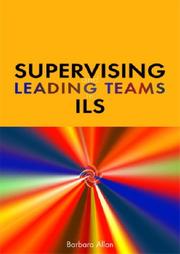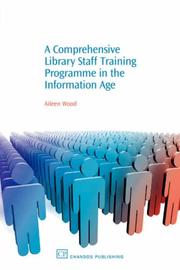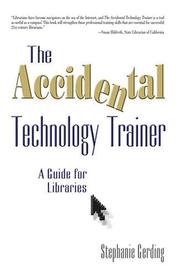| Listing 1 - 10 of 16 | << page >> |
Sort by
|
Book
ISBN: 0081019246 0081019238 9780081019245 9780081019238 9780081019238 Year: 2017 Publisher: Cambridge, MA : Chandos Publishing,
Abstract | Keywords | Export | Availability | Bookmark
 Loading...
Loading...Choose an application
- Reference Manager
- EndNote
- RefWorks (Direct export to RefWorks)
Staff-Less Libraries: Innovative Staff Design considers the challenges of this approach, its pros and cons, identifies international experiences, and discusses best practices. It presents a step-by-step approach to implementing a staffless library and/or services, and seeks to inspire professionals to share experiences and optimize their library. Staff-less public libraries, enabled by technological developments, represent a significant and innovative aspect of the development of public libraries. The concept radically enlarges the availability of user access to public libraries. Some Danish public library branches have, for example, increased their weekly opening hours from 20 to 80 hours per week. In Denmark, the concept has been quite successful, increasing the number of staff-less libraries from 81 public library units in 2011 to 260 in 2014. From a longer view, however, the staff-less library concept contributes to the modernization of public libraries by further opening the library. Many library professionals have been surprised by the near absence of vandalism through the staffl-ess opening hours. According to the latest trend, the staffless library model is gradually moving from thinly populated rural areas and suburban neighborhoods to urban contexts. This book explores the concept, hence furthering the debate. Presents and considers the idea of staff-less libraries using evidence-based data Considers the challenges, pros, and cons of the staff-less library Identifies international experiences, best practices, and draws out a step-by-step approach to implementation
Library employees. --- Libraries. --- Libraries --- Library staff --- Library personnel --- Employees --- Documentation --- Public institutions --- Librarians
Book
ISBN: 0838997163 9780838997161 Year: 2009 Publisher: Chicago American Library Association
Abstract | Keywords | Export | Availability | Bookmark
 Loading...
Loading...Choose an application
- Reference Manager
- EndNote
- RefWorks (Direct export to RefWorks)
Singer and Francisco tackle the new challenges facing administrators and human resources planners such as retirement of the Baby Boomers, determining the compensation value of an MLS, and how to retain your organization's high-performing employees.
Library employees --- Job evaluation --- Job analysis. --- Libraries --- Library staff --- Library personnel --- Employees --- Analysis, Job --- Personnel management --- Evaluation, Job --- Job rating --- Rating, Job --- Evaluation --- Occupations --- Job analysis --- Salaries, etc. --- Job descriptions
Book
ISBN: 0585350337 9780585350332 0838934374 9780838934371 Year: 1994 Publisher: Chicago American Library Association
Abstract | Keywords | Export | Availability | Bookmark
 Loading...
Loading...Choose an application
- Reference Manager
- EndNote
- RefWorks (Direct export to RefWorks)
Public services (Libraries) --- Library employees --- Library education (Continuing education) --- Library personnel management --- Library & Information Science --- Social Sciences --- Continuing education --- Library education --- Libraries --- Library staff --- Library personnel --- Employees --- Training of --- In-service training
Book
ISBN: 0838919650 9780838919651 9780838919668 0838919669 9780838912287 0838912281 0838196683 9780838196687 Year: 2014 Publisher: Chicago
Abstract | Keywords | Export | Availability | Bookmark
 Loading...
Loading...Choose an application
- Reference Manager
- EndNote
- RefWorks (Direct export to RefWorks)
While it's inspiring to ponder the libraries of the 22nd century, it's a lot more practical to think ahead to the next five years. That's just what Varnum and his hand-picked team of contributors have done, showing library technology staff and administrators where to invest time and money to receive the greatest benefits. Their ideas will stimulate strategic thinking and help library staff make informed decisions about meeting user expectations and delivering services. Sure conversation starters and informative for any library, chapters include"Impetus to Innovate: Convergence and Library Tren
Librarians --- Library employees --- Technological literacy. --- Library education. --- Information technology --- Library science --- Professional education --- Library schools --- Libraries --- Library staff --- Library personnel --- Employees --- Information scientists --- Literacy, Technological --- Effect of technological innovations on. --- In-service training. --- Study and teaching. --- Education --- Study and teaching

ISBN: 1856049892 9781856049894 9781856045872 1856045870 1306342333 Year: 2007 Publisher: London
Abstract | Keywords | Export | Availability | Bookmark
 Loading...
Loading...Choose an application
- Reference Manager
- EndNote
- RefWorks (Direct export to RefWorks)
Anyone wishing to be a successful supervisor must learn the interpersonal skills of communication, assertiveness and motivation in order to build a successful team with a positive ethos. This book provides a practical guide to supervisory skills for team leaders and supervisors in library and information work. Although reference is made to relevant management concepts, its strength is that it translates theory into practice, and the focus is decidedly on the latter. This is very much a 'how to' guide for anyone wishing to develop a supervisory role in an ILS context. Each topic is covered in a practical and down-to-earth manner, and is illustrated by examples and case studies from different types of ILS. The text also offers self-assessment audits and other activities to enable the reader to relate the tools and techniques to their own work situation. Key topics covered are: the role of team leader in ILS; leading and managing the team; confident leadership and supervision; the psychology of motivation; managing the work; communication skills; managing and leading complex teams; human resource management; workplace learning and training; and, personal and professional development. This is an essential tool for new and aspiring supervisors and team leaders in ILS, and for more experienced supervisors who wish to dip into it to refresh their approach. It will also be of great value to ILS students.
Library personnel management. --- Library employees. --- Supervision of employees. --- Integrated library systems (Computer systems) --- ILSs (Computer systems) --- Integrated library systems (Computers) --- Library management systems (Computer systems) --- Computer systems --- Libraries --- Employees --- Personnel management --- Library staff --- Library personnel --- Librarians --- Automation

ISBN: 1843341190 9781843341192 1843341182 9781843341185 9781780631066 1780631065 Year: 2007 Publisher: Oxford, England : Chandos Publishing,
Abstract | Keywords | Export | Availability | Bookmark
 Loading...
Loading...Choose an application
- Reference Manager
- EndNote
- RefWorks (Direct export to RefWorks)
This book discusses the issues surrounding the implementation and 'selling' of a comprehensive library staff training programme. Importantly, it contains many tried and tested techniques used by the author; it also includes standard documentation that readers can use in their own organisation for training purposes.Covers the different types of training and the pros and cons of eachDiscusses the administrative role as a change agentShows how to develop programme objectives and measureable outcomes
Library management --- Personnel management --- Library employees --- Bibliothèques --- Training of. --- Personnel --- Formation --- -020 --- Libraries --- Library staff --- Library personnel --- Employees --- Training of --- Library science. --- Librarianship --- Library economy --- Bibliography --- Documentation --- Information science --- -Training of
Book
ISSN: 12594857 ISBN: 9791091281355 2375460677 9791091281171 9782375460672 Year: 2015 Volume: 32 Publisher: Presses de l’enssib
Abstract | Keywords | Export | Availability | Bookmark
 Loading...
Loading...Choose an application
- Reference Manager
- EndNote
- RefWorks (Direct export to RefWorks)
Comment conduire le changement de manière efficace dans le contexte très particulier introduit par les révolutions du numérique et des réseaux dans les bibliothèques ? Comment assurer le bon fonctionnement d’un équipement lorsque le rythme des changements à conduire s’accélère ? Ce volume apporte des éléments de réponses pratiques, tirées de réalisations concrètes et propose une réflexion plus générale sur les modalités du management en bibliothèque, centrée sur la notion émergente, dans les institutions publiques, d’organisation apprenante.
Library personnel management. --- Library employees --- Effect of technological innovations on. --- Libraries --- Library staff --- Library personnel --- Employees --- Librarians --- Personnel management --- apprentissages --- management --- méthodes agiles --- bnf --- formation --- innovations technologiques --- bibliothèques universitaires --- Library personnel management --- Information services --- Library Administration --- Library Services --- Library administration --- Bibliothèques --- Effect of technological innovations on --- Administration --- Personnel --- Effets des innovations sur le
Multi
ISBN: 9781856048286 9781856049634 1856049639 9781306694445 1306694442 1856048284 1783303166 Year: 2013 Publisher: London
Abstract | Keywords | Export | Availability | Bookmark
 Loading...
Loading...Choose an application
- Reference Manager
- EndNote
- RefWorks (Direct export to RefWorks)
In order to make an impact with their customers, library staff must be well trained and up-to-date. Training is often delivered by library managers, development officers and trainers who may have limited budgets with access to few resources. This accessible guide uses case studies and examples of best practice from public, school, academic, special and government libraries to help library and information workers deliver excellent training practice. Increasingly, library and information staff are being asked to do more and more with fewer resources. In the context of higher education and further education, library and information workers are often involved in training large, diverse groups of more than 100 students, who may have limited resources. In public libraries, library staff may be involved in delivering a wide range of training activities to extremely diverse groups. Many library and information workers in special libraries deliver end-user and specialist training to busy professionals who are unlikely to have the time to attend pre-scheduled workshops. In addition, the rise of social networking tools and other information and communication technologies, has meant that training practices are continually changing to meet the expectations of participants. This book provides guidance on the design and delivery of effective training courses and is aimed at helping experienced trainers, as well as those who are still developing their skills, including: The people side of training; Use of technologies to support training practices; Different approaches to learning and teaching; Planning and designing training; Delivering training: face-to-face and blended learning; Evaluation of training events and continuous improvement; Learning and development in the workplace. The book will be essential reading for all library and information workers involved in training.
Library employees --- Librarians --- Bibliothèques --- Bibliothécaires --- In-service training. --- Personnel --- Formation en cours d'emploi --- leerinhouden --- bibliotheekwezen --- bibliotheekinstructie --- Library management --- bibliotheekmanagement --- Bibliothèques --- Bibliothécaires --- Libraries --- Library staff --- Library personnel --- In-service training --- Employees --- Information scientists --- Information services --- Information services instruction --- Orientation (Information services) --- User education (Information science) --- Information science --- Library orientation --- Training of. --- User education. --- Study and teaching

ISBN: 1573872695 9786613379153 1283379155 1573879355 9781573879354 9781573878685 1573878685 9781573872690 Year: 2007 Publisher: Medford, N.J. Information Today
Abstract | Keywords | Export | Availability | Bookmark
 Loading...
Loading...Choose an application
- Reference Manager
- EndNote
- RefWorks (Direct export to RefWorks)
Libraries and adult education. --- Information technology --- Library employees --- Training. --- Library surveys --- Study and teaching. --- In-service training. --- Skills training --- Libraries --- Library staff --- Library personnel --- Adult education and libraries --- Public libraries and adult education --- Employees --- Education --- Teaching --- Adult education --- Academic libraries --- Services to adult college students
Book
ISBN: 9781785604997 1785604996 1785604988 9781785604980 Year: 2015 Publisher: Bingley, U.K. Emerald
Abstract | Keywords | Export | Availability | Bookmark
 Loading...
Loading...Choose an application
- Reference Manager
- EndNote
- RefWorks (Direct export to RefWorks)
The latest volume of Advances in library administration and organization, contains approaches from researchers around the world. Sourced in management theory and hands-on practice, the chapters explore such issues as skills-building and other professional development activities, changing demographic profiles of staff, changing modes of resource provision, succession planning, remote work, and planning for Linked Data. New approaches to student staffing are examined, along with the relationship of library work to topics such as emotional intelligence and positive organizational behavior. Several chapters put forth research and case study information regarding methods for dealing with large-scale changes in library staffing with regard to budget, space, and mode of information delivery. The work as a whole addresses sustainability issues in library staffing both regarding the day-to day work of libraries and in planning for the future. Library staffing for the future provides the reader with a thorough look at relevant staffing issues for libraries today and going forward, and provides advice and information grounded in the theoretical as well as the practical.
Personnel management --- Library management --- Library administration --- Library employees --- Student library assistants --- Bibliothèques --- Etudiants salariés dans les bibliothèques --- Administration --- Personnel --- Library administration. --- Library personnel management. --- Library employees. --- Libraries --- Library staff --- Library personnel --- Employees --- Librarians --- Management --- Organization --- Language Arts & Disciplines --- Library, archive & information management. --- Library & Information Science --- Administration & Management*. --- Personnel management. --- Employees.
| Listing 1 - 10 of 16 | << page >> |
Sort by
|

 Search
Search Feedback
Feedback About UniCat
About UniCat  Help
Help News
News